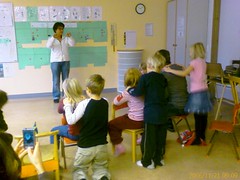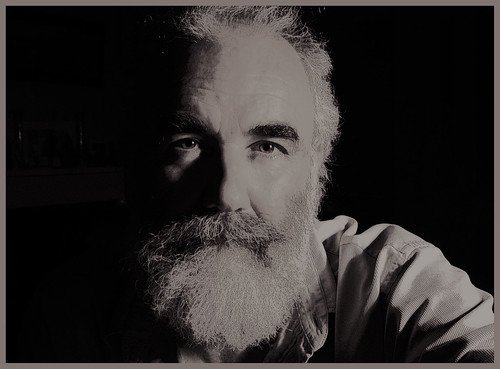
Daily massage
Originally uploaded by mthorn_hawkesfarm.
Really interesting visit to Kungsgarden school yesterday. First of all we saw the youngest class in the school (where the course organiser, Mona Wiklander, works) learning to read and write JUST using computers. They did no handwriting with pencil and did not follow the usual letter by letter introduction to the alphabet but, with the help of speech-enabled sofware and capitalising upon the largely phonetic base of the Swedish language, they quickly progressed to producing lucid paragraphs of text that they could then read back. That in itself was impressive enough. Even more surprising was the fact that when they started to use handwriting the following year, the results were far neater than those of a control group who had started school with the traditional introduction to letter formation. The question is whether or not this radical approach to digital competence could be replicated in England, where formal schooling begins two years earlier.
In the afternoon we visited a class of older children and discovered how digital tools and competences were being utilised to enable distance learning. In this class of 10-12 year olds [years 5 - 7] students are allowed to elect to spend up to one day a week learning from home. On the day of our visit, six children were learning at home. We asked if the parents or any adults were there with them. The answer was almost certainly not, but that both school and home were comfortable with that. And all six of these were from the younger end of the class - in other words, Y5.
'FirstClass' is the software used as the backbone to the system, enabling constant contact between teacher, home learners and fellow pupils via online chat and email.
These radical approaches to the development and utilisation of digital competences are underpinned by the fact that the curriculum in Sandviken's schools is goal based, not content based. Yesterday we were shown the curriculum document - a thin pamphlet. The learning atmosphere in this older class was reminiscent of that generated by the best English schools more than twenty years ago, prior to the national curriculum, when independence and learning attitudes were more important than content.
We couldn't help but notice other admirable aspects of this school, not least the high professional competence and relish-of-their-work exhibited by the teachers, most of whom had been working at the school for many years.
There was also a remarkably relaxed attitude towards matters such as risk assessment. Two examples:
Every class at Kungsgarden spends a whole day each week no matter what the weather in the forest or by the lake, accompanied by just two members of staff [both teachers; there are no TA's in Sandviken schools].
The oldest class have weekly woodwork lessons in a workshop equipped with power tools. Enhancing this work is a project run by a group of local retired men, who take the children fishing, get them to design and make sheaths for knives, etc. We assumed that at least some of these retired folk were grandparents of the school-children. They are not, so we assumed that there was a need to carry out police checks, a notion responded to with a degree of bemusement which demonstrated the social divide between the uptight British scared-to-get-blamed culture and the much more relaxed Swedish approach.
A UK language assistant working at the school confirmed this, saying that when she first arrived she was amazed that various outside activities were undertaken [in all weathers] without any need for signed permissions from parents. She also pointed out another commendable feature of the Swedish education system: when children from other countries enter the school there is a legal obligation to provide them with ongoing teaching support for their native language, as well as the more expected 2nd language support in Swedish.
The standards of wriiten work achieved by the children in the two classes observed reflected the fact that Swedish children begin formal education two years later than English children. And yet the evidence suggests they catch up at secondary school; something which we hope to see demonstrated on one of our next visits.

No comments:
Post a Comment